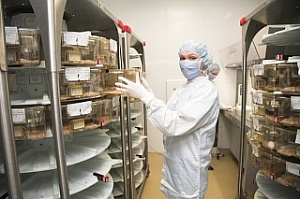Mikhail Moshkin, Director of the Center for Genetic Resources of Laboratory Animals, gave a lecture to TSU biology students in which he spoke about modern embryo technology, which is used in medicine, animal husbandry, and the conservation of endangered species. Students also learned how genomic editing has created new lines of laboratory animals and received an invitation to practice at the Center for Genetic Resources in Novosibirsk.
- In vitro fertilization (IVF), which most people know as a tool for overcoming infertility problems, solves a much wider range of problems,- explained Mikhail Moshkin, who is also a visiting professor at TSU’s Biological Institute. - For example, experimental embryo technologies are becoming increasingly popular for the replication of highly productive farm animals. They help us to solve the problem of breeding and creating a pedigree nucleus much more efficiently and 10 times faster than if it happened naturally.
Also, in the context of a sharp decline in biodiversity on the planet, IVF is being used to conserve species that are on the verge of extinction. But the main task performed by our center is to create methods of transgenesis of animal lines with target mutations. Studies help us to accumulate knowledge about how individual genes and their combinations are associated with the characteristics of the individual development of the human body and to identify the characteristics of the response to various environmental factors. New knowledge is necessary for understanding the pathological processes of a genetic nature.
For example, a new line of mice was created for the Tomsk Scientific Research Institute of Medical Genetics, whose scientists are investigating the features of a serious hereditary disease associated with a violation of the three-dimensional organization of the genome. Studying mice with a similar genetic breakdown will help physicians identify the mechanism of pathology formation and assess the possibility of preventing it.
At the end of the lecture, Mikhail Moshkin answered students' questions and invited those who wish to practice at the Center for Genetic Resources of Laboratory Animals.
- Students of the Biological Institute, starting from the third year of undergraduate studies, can get this opportunity,- said Nina Moskvitina, head of the Department of Vertebrate Zoology and Ecology of the TSU Biological Institute. - To get practice at the Center for Genetic Resources of Laboratory Animals, students must have a certain knowledge base that makes it possible for them to perform the tasks set by the center’s staff.
As Nina Moskvitina noted, students at the Biological Institute can not only undergo practical training but also receive a specialty, studying at the Center. The close collaboration led to the creation of the master's program Test Objects of the Animal World for Translational Medicine. Students who choose this profile study part of the subjects at TSU, and six subjects at the Center, including reproductive technologies, genomic editing, high-tech phenotyping, and others.
- Master’s students have the opportunity to gain unique experience under the guidance of highly qualified specialists who use the latest technology,- Nina Moskvitina noted. - The Center for Genetic Resources of Laboratory Animals is included in the national registry of world-class scientific infrastructures. Studying there, master’s students get the opportunity to master the new-generation equipment, which significantly increases their competitiveness in employment.

